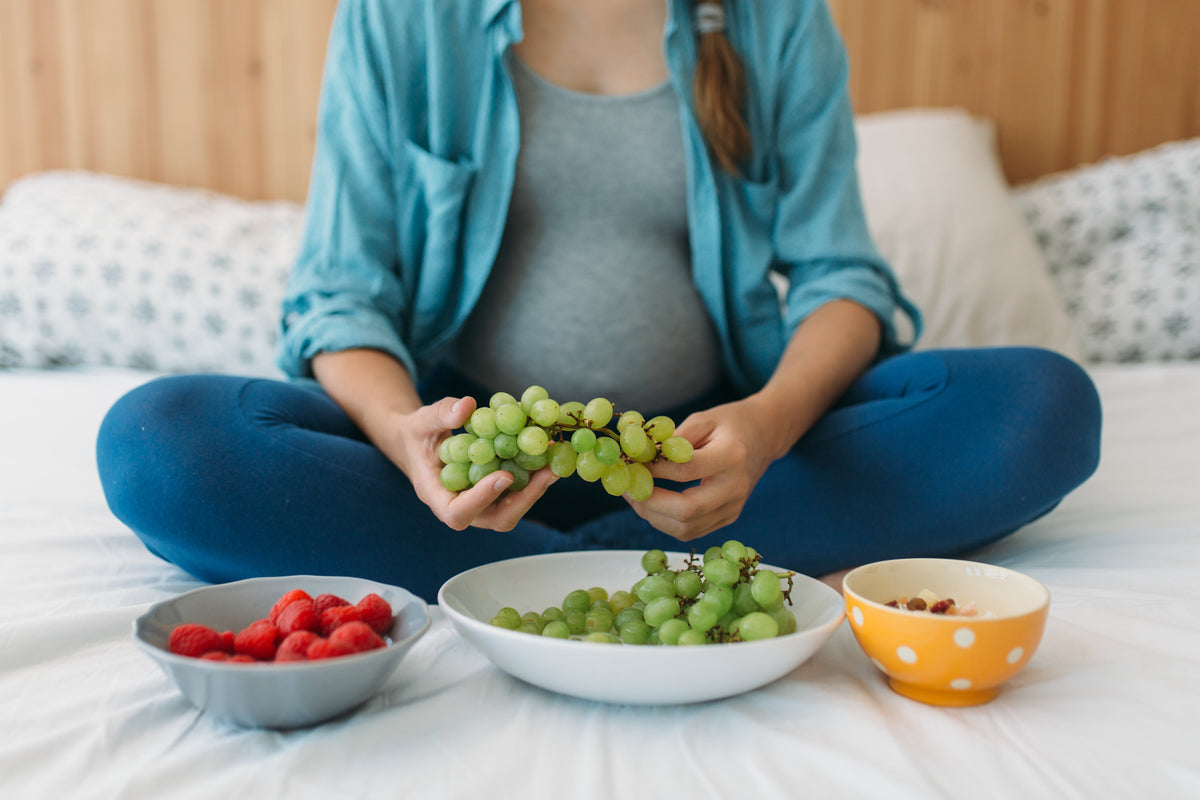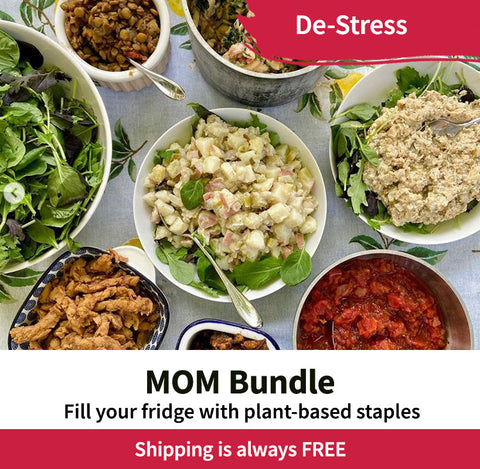
Quick Take
Pregnant and vegan and have questions about nutrition? Here's how I got all the essential nutrients for me and my baby during my vegan pregnancy.
Before We Begin: Get All The Nutrients You Need, Without the Meal Prep!
Fill your fridge with ready-made and delicious plant-based meals from MamaSezz. WFPB takes on classic comfort foods so you can enjoy the flavors you love while getting the nutrients you need. Get started now.
On This Page
The Best News of my Life!
Is a Vegan Pregnancy Safe?
7 Key Nutrients for a Healthy Vegan Pregnancy
3 Day Sample Meal Plan from my Vegan Pregnancy
The Best News of my Life!
In August 2019, I woke up to the greatest news, after a quick trip to the bathroom. My husband was on his morning run and as I was mentally planning on how to tell him, I found myself snapping a photo and sending it to him. We were both thrilled!
When the initial excitement settled down a bit, I found myself worrying about a whole lot of new things: were we prepared; where will we raise the baby; did we need to move; is my diet healthy enough to grow and sustain a tiny baby?
Is a Vegan Pregnancy Safe?
By that time, I was already a vegan for almost five years, Certified in Plant-Based Nutrition and a Health Coach myself so I had some knowledge on vegan pregnancies. However, it's a whole new game when it's you who's pregnant and vegan.
After my first appointment with my doctor, I was happy to hear that most of the foods you should avoid when pregnant are not vegan anyway: fish, unpasteurized cheese, uncooked eggs. It turned out that the only thing I needed to pay extra attention to was to wash my fruits and vegetables thoroughly, consume enough calories and make sure to include iron-rich foods in my meals.
In addition to that, there are vitamins and minerals that are essential for a healthy vegan pregnancy (or any pregnancy!), and the good news is you can easily get them from your vegan diet!
7 Key Nutrients for a Healthy Vegan Pregnancy
1. Calcium

The recommended intake for calcium during pregnancy is actually the same as before pregnancy, 1000 mg per day for women aged 19-50. In fact, calcium absorption from plants is often superior to that of dairy products. Good sources of calcium include tofu and soybeans, dark leafy green vegetables, broccoli, sunflower seeds, tahini, almond butter, calcium-fortified non-dairy milk, and calcium-fortified cereals and juices.
2. Essential fatty acids

Alpha-linolenic acid (ALA) is an essential fatty acid since it converts into omega-3 fatty acids (DHA and EPA) in the body. The recommended intake for ALA during pregnancy is 1.4 g per day. Flaxseeds and flaxseed oil are the most concentrated sources of ALA found in plants. DHA is the most well-known fatty acid when referring to a plant-based diet. Since vegans don’t consume any preformed DHA in their diet, they must convert it from ALA. If a pregnant and vegan woman and concerned about consuming enough DHA, there are microalgae-based supplements available in the market.
3. Folate

Folate is essential especially during the first weeks of pregnancy, in preventing neural tube defects of the growing baby. As you can guess from its name, its natural source is leafy greens. Legumes are also rich in folate, but due to the erratic nature of most diets, it’s advised to take a prenatal vitamin that provides at least 400 μg per day.
4. Iron

Iron during pregnancy needs to increase to help with the development of the fetus and placenta and to maintain increased maternal blood volume. The recommended intake for iron during pregnancy is 27 mg per day. Due to the less efficient absorption of iron from plant sources, iron supplements are often needed to compliment a woman’s diet during vegan pregnancy. Make sure to avoid taking iron supplements at the same time as tea, coffee, or calcium supplements. Plant-based iron sources include whole grains, dark green vegetables, legumes, nuts, seeds, dried fruit, and blackstrap molasses. As an extra tip, include vitamin C-rich foods at meals to increase iron absorption!
5. Vitamin B12

Vitamin B12 needs only slightly increase during pregnancy, to 2.6 μg per day. Since vegans do not take any vitamin B12 naturally through their diet (unless we include fortified cereals and nondairy milk), it is prudent to take a supplement or choose a good prenatal vitamin that contains vitamin B12.
6. Vitamin D

Like calcium, the recommended intake for vitamin D is the same as before pregnancy, at 5 μg per day, and it is very important that pregnant women get enough of this essential vitamin. Naturally, vitamin D is made in the body as the result of exposure to sunlight for 5-15 minutes per day between the hours of 10 am and 3 pm. This nutrient is poorly supplied in all diets unless people take a supplement for it or consume foods that are fortified with it, such as ready-to-eat cereals and nondairy milk. However, a good vegan prenatal will provide all the vitamin D you and your baby need during your vegan pregnancy.
7. Zinc

The recommended intake for zinc during pregnancy is 11 mg per day, however, in vegan women, needs may be higher due to lower absorption rates. No need to worry though as zinc is often included in prenatal vitamins, and can be naturally found in legumes, nuts, whole grains, and cereals. Additionally, by combining zinc sources with acidic ingredients such as lemon juice or tomato sauce, you can significantly increase zinc absorption.
What I Ate During my Vegan Pregnancy: 3 Day Meal Plan
During my pregnancy I was aiming to consume vitamin-rich foods, high in protein and nutrition, while allowing some treats once in a while. A typical 3-day meal plan looked like this:
Day 1
Breakfast: Two slices of wholegrain bread, with peanut butter, or mashed avocado with hemp seeds, and a piece of fruit.
Lunch: Burrito Bowl - black beans, seasoned quinoa, avocado, tomato,
sweetcorn, with an oil-free dressing)
Dinner: Lentil spaghetti bolognese, with arugula side salad
Day 2
Breakfast: Soy yoghurt with granola, berries, and nut butter (usually peanut)
Lunch: Red lentil curry with rice
Dinner: Black bean or veggie burger with a side of sweet potato, oven baked fries
Day 3
Breakfast: Smoothie made with fortified soy or almond milk, ground flax seeds, berries, spinach, nut butter
Lunch: Tu-no sandwich (made with mashed chickpeas, salad greens, tomato, cucumber, hummus)
Dinner: Baked seasoned tofu with quinoa, and roasted vegetables
Snacks for my Vegan Pregnancy
During the day, I was snacking a lot, as having a full stomach settled my morning sickness. Snacks were consistent every day, and they included:
- A handful of trail mix
- A bowl of berries
- A little dark chocolate
- Carrots and hummus
- After the 35-week mark I also started adding Medjool dates in my diet plan to promote cervical ripening.
Pregnancy can be an exciting and challenging period in a woman's life, but one thing you won't need to worry about is making sure that you and your growing baby get all the nutrients you need from your vegan diet. That said, if you have any concerns about your nutritional needs during your own vegan pregnancy, be sure to speak with your healthcare providers.
Key Takeaways
- A vegan pregnancy can indeed be safe (and wonderful)! Like any pregnancy, you want to ensure you're getting enough of the right nutrients, like calcium, essentially fatty acids, folate, iron, vitamins B12 and D, and zinc.
- Pregnant vegans with a well rounded plant-based diet may choose to take prenatal vitamin as a way to fill in any nutritional gaps, particularly to get adequate amounts Vitamins B12 and D.
**
Rafaela Michailidou is a Vegan Lifestyle Coach, and a freelance health and wellness content writer, with a Plant-Based Nutrition Certificate from the T. Colin Campbell Center for Nutrition Studies.

